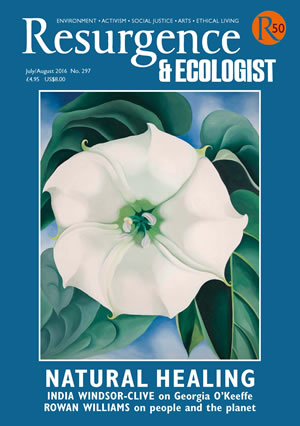In India there are four major indigenous religions: Hinduism, Buddhism, Sikhism and Jainism. There are also four significant religions that came from abroad but have made important contributions to the life of Indians: Christianity, Islam, Zoroastrianism – the religion of the Parsee community – and Judaism. Among these eight religions of India, Jains are probably the least well known. There are only about 4 million Jains worldwide, most of them in India.
The highest and most profound principle of Jainism is nonviolence (Ahimsa). This is the principle of total and comprehensive nonviolence of thought, speech and action. This means nonviolence to oneself, nonviolence to others and nonviolence to Nature. Of course Jains realise that complete nonviolence is not possible, but we are required to be mindful of our mental, verbal and physical activities in order to minimise any damage we may inflict on ourselves or other living beings. This constant awareness is key to maximising compassion and minimising harm.
The importance of nonviolence is recognised by many religions, but in most cases it is interpreted to mean nonviolence to other humans. But Jains preach and practise nonviolence to all living beings.
Jains recognise that earth, air, fire, water, plants, forests, insects, animals, birds – in other words the entire natural world – are all alive. Nature is soulful and intelligent. Therefore life – not just human life, but all life – is sacred and must be treated with reverence. So Jain ecology is reverential ecology. Therefore the Jains must respect even the mosquitos and not kill them! Jains have set up hospitals and sanctuaries for old or wounded animals and birds.
Many people believe that somehow human life is superior to non-human life, and that in order to sustain and maintain human life we can therefore sacrifice animal life. That is why the production and consumption of meat is prevalent in the world, and the destruction of rainforests and the overfishing of the oceans are so widely practised. But Jains are required to have equal reverence for human life and non-human life. Therefore not only are the production and consumption of meat and fish out of the question for Jains, but Jains are also required to limit their consumption of vegetable matter.
My mother would not eat potatoes or carrots or any other root vegetables because she believed that disturbing the soil and uprooting the plants was a subtle form of violence. She believed that we should only take what the plants give us as ripened fruit. She would limit the numbers of vegetables and fruit she consumed. She would say that the practice of nonviolence necessitates the practice of restraint.
Through the practice of restraint we make peace with ourselves, peace with people and peace with Nature. Keeping animals in cruel conditions in factory farms, poisoning the soil with artificial chemicals, destroying rainforests and overfishing the oceans are acts of war against Nature. The principle of Ahimsa necessitates peace with planet Earth.
Life is interdependent and interconnected. We are all related: humans and animals are related, forests and animals are related. As in a family parents and children, husbands and wives, brothers and sisters take care of each other, receive and give mutual support, so we should treat people of all nations, religions, races and colours as our brothers and sisters and practise compassion towards all. Before we are Americans or Russians, British or French, Indians or Pakistanis, Hindus or Muslims, Christians or Jews, Buddhists or Jains, black or white, we are all humans. We are members of one human family. But this sense of the unity of all life goes beyond human life. The birds flying in the sky, animals wandering in the forests, and earthworms working in the soil are all our relations, and therefore we may not harm them. Our sacred duty is to practise compassion and enhance all life.
This is the principle of nonviolence.
Then there is another Jain principle of equal importance: that of Aparigraha. It is a very beautiful word, but it is not easy to translate. It means freedom from the bondage of material possessions. It is an ecological principle. It is a principle of reduction in consumption and minimal accumulation of material possessions. If I can manage with three or four shirts, why do I have to have ten or twenty? I can only wear one at a time. If I can manage with one pair of regular shoes, maybe a pair of walking shoes and a pair of sandals, that is enough. Why do I need to accumulate a cupboard full of shoes? This goes for every material possession. Jains are required to use material objects to meet their need and not their greed, and free themselves from the burden, worry and anxiety of owning stuff.
The principle of non-accumulation or Aparigraha is just the opposite to the modern idea of the economy, where maximisation of production and maximisation of consumption is the driving ideal. Even at the time of religious festivals such as Christmas and Easter, shopping and consumption takes priority over any religious practice. People become so obsessed with buying and selling that they are left with little or no time for their spiritual nourishment. No time for themselves, no time for meditation, and no time to study a spiritual text.
In a consumer society, poets and artists are a rare breed. The majority of people have no time for poetry, art or music. No time for family or friends. No time to go for a walk in solitude and appreciate Nature. No time to celebrate. This kind of life is the antithesis of Aparigraha. If we were to restore and rejuvenate the principles of Ahimsa and Aparigraha we would have no ecological crisis, no depletion of resources, no waste, no pollution, no climate change, no social injustice, no strikes, and no exploitation of the weak.
Ahimsa and Aparigraha emphasise the quality of life over quantity of material possessions. With good care of the Earth, all humans can have a good life, good food, good housing, good education, good medicine – which is very different from a lot of bad food, bad housing, bad education, bad medicine, and much besides. For Jains the question is not how much you have, but whether your life is good, happy and fulfilled. Less is more, as long as that less is of a nourishing and nurturing quality.
Ultimately Jain ecology implies reverence for Nature, restraint in consumption, celebration of the spirit, and a life of elegant simplicity.








